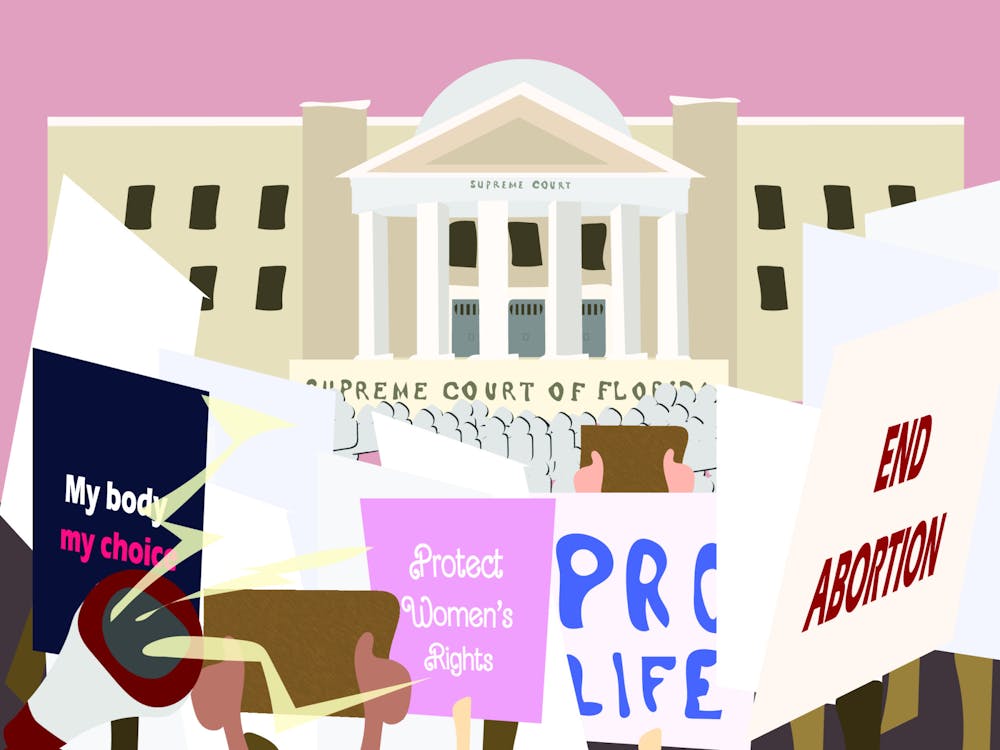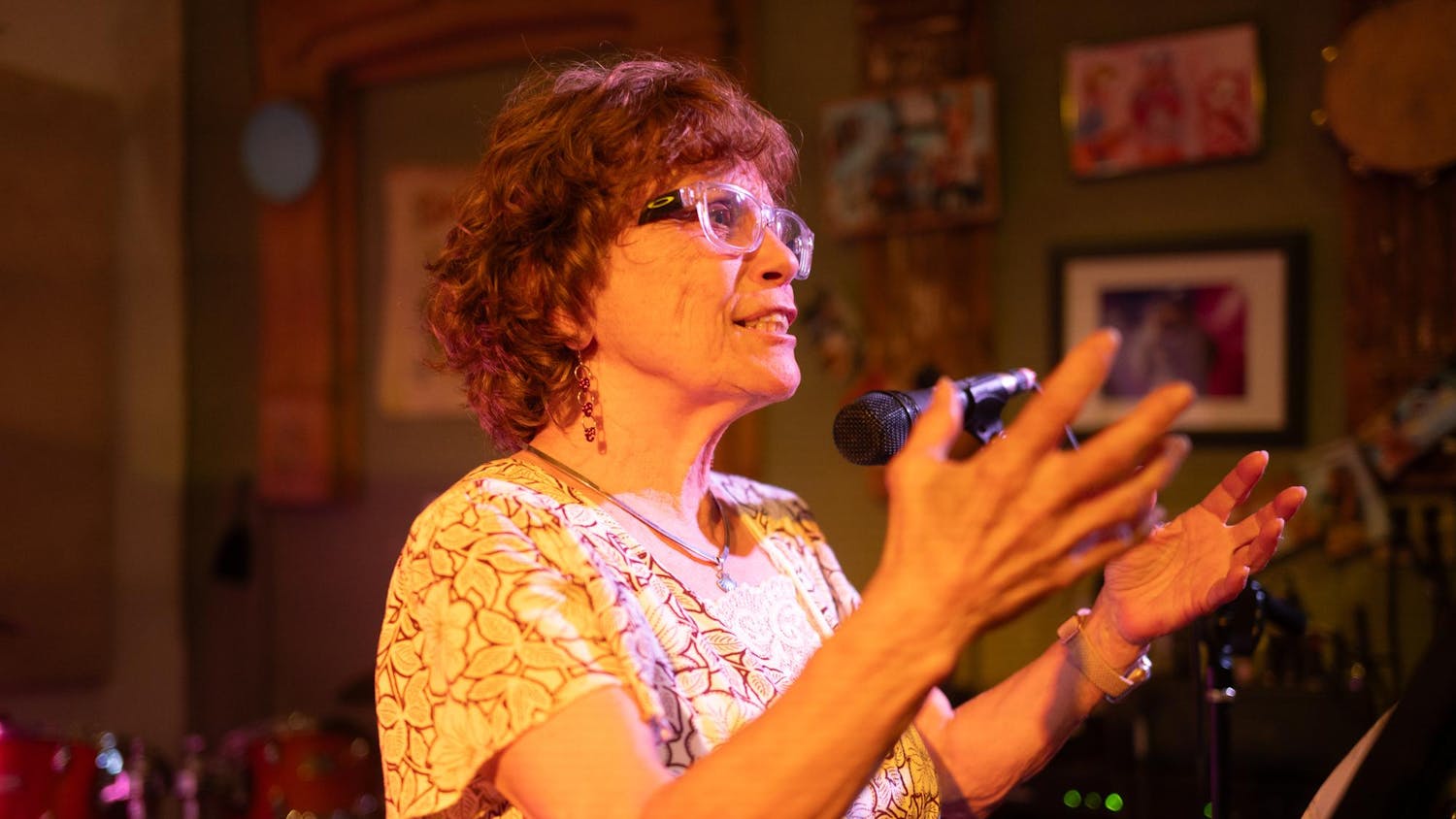As April ebbed away, Sarah Parker dreaded what’s to come when the clock strikes May: an even stricter state abortion ban in the wake of a world post-Roe v. Wade’s overturn.
“This isn’t political,” she said. “This is life or death for some people. This is our right, and this is our right to bodily autonomy.”
The Florida Supreme Court upheld the state’s 15-week abortion ban April 1, concluding the years-long legal challenge and instituting a new six-week ban. On the same day, the court also approved an opposing state constitutional amendment to appear on the November general election ballot, leaving the fate of abortion access in the hands of Florida voters.
While the six-week ban was officially signed into law by Gov. Ron DeSantis last year, a lawsuit against the previous 15-week ban launched by Planned Parenthood and other advocacy groups temporarily paused its enactment.
“Planned Parenthood cannot overcome the presumption of constitutionality and is unable to demonstrate beyond a reasonable doubt that the 15-week ban is unconstitutional,” the court justices wrote in a majority opinion.
The six-week ban is set to take effect May 1.
On the other hand, Amendment 4, backed by Floridians Protecting Freedom along with a collection of reproductive rights groups, aims to enshrine abortion access in the Florida constitution. If approved by at least 60% of state voters in November, it would disallow government restrictions before fetal viability at approximately 24 weeks of pregnancy with exceptions for a pregnant patient’s health and safety.
Florida Attorney General Ashley Moody argued the initiative’s language was vague and confusing with the aim of misleading constituents, a challenge struck down by the court April 1.
Voices of Florida Executive Director Sarah Parker aided in crafting Amendment 4’s language, which read in part, “No law shall prohibit, penalize, delay, or restrict abortion before viability or when necessary to protect the patient’s health, as determined by the patient’s healthcare provider.”
While the “bait and switch” passage of the initiative would counteract tightening restrictions, Parker said the six-week ban’s ripple effects would remain.
“There’s nothing positive that’s happening from this,” she said.
As a Black woman, she said her chances of feeling safe carrying a future pregnancy to term under the new ban have dwindled.
According to the Centers for Disease Control and Prevention, the nationwide 2021 Black maternal mortality rate was 69.9 deaths per 100,000 live births, over two times higher than 26.6 for white mothers. The Commonwealth Fund found that 2020 maternal mortality rates were 62% higher in states restricting abortion than those that were not.
“What are my chances of dying while giving birth?” Parker said. “Why is that discrepancy real?”
In a post-Roe world, she said the approval of a six-week ban has plunged Florida farther from the future.
Before the 1973 enactment of Roe v. Wade, Florida had a near-total ban on abortion, and since the overturn of Roe v. Wade in 2022, restrictions have once again wound tighter with each passing year.
“It has turned back the clock, but we cannot live in the past,” Parker said.
Voices of Florida, a statewide advocacy group, will educate and engage young voters on Amendment 4 leading up to the November general election, she said.
Following an increase in women unable to receive appropriate healthcare before developing extreme symptoms due to the 15-week ban, a decrease to six weeks is “horrifying” to those faced with unexpected pregnancies, said Florida Senate Minority Leader Lauren Book, D-Davie.
“Women and girls will die,” she said.
In response to DeSantis signing the ban into law, Book was arrested in a peaceful demonstration outside Tallahassee City Hall along with 10 other pro-choice protesters last year. The new restrictions will have disproportionate impacts on both minorities and those who can afford healthcare the least, she said.
Unlike Florida’s current restrictions, the six-week ban includes exemptions for rape, incest and human trafficking, but Book emphasized the difficulty for women and girls surviving sexual assault to prove their stories.
“This is going to make it much, much harder for women to be believed,” she said.
Before Amendment 4 received the green light to appear on the general election ballot, Book aided in collecting the minimum of 900,000 signatures needed for approval. Even if the initiative was approved by a majority of voters, she said the struggle against government interference still wouldn’t be over.
The amendment would likely be challenged and need to appear before the Florida Supreme Court again, and while Book believes it would prevail, she said the process would be long.
“That takes time, and women are hanging in the balance,” she said.
The six-week ban is only a small part of a larger post-Roe picture, Book said, emphasizing the state’s past support of crisis pregnancy centers and the enforcement of 24-hour waiting periods prior to the procedure.
“Republicans have been chipping away at a woman’s right to choose in many, many, many different ways,” she said.
Book felt lawmakers supporting the new ban were “out of touch” with Florida voters.
Ashley Sanguino, UF Planned Parenthood Generation Action outreach director, said she was “devastated” following the court’s approval of the six-week ban.
“That basically leaves you two weeks after you missed your first period,” said the 20-year-old UF political science junior.
As a young adult, she said facing the idea of limited bodily autonomy is difficult, especially when an unexpected pregnancy could act as a barrier to education and professional opportunities.
“I just think of all the students who may think they are alone in this situation and that the state essentially has just kind of abandoned them with this decision,” she said. “It is definitely an emotional and mental toll to the student body.”
With the increase in risk associated with pregnancy, she felt there’s been an upturn in awareness of safe sex practices and contraceptives among her peers. As a member of the campus chapter of Planned Parenthood Generation Action, she said the organization’s priority will be educating those young people on Amendment 4 through voter registration and events.
The protests following the overturn of Roe v. Wade were the reason she became involved in reproductive rights advocacy, an issue exacerbated by the new ban that Amendment 4 has the power to fix, she said.
“This reflects an attack on wanting to control women,” she said. “Is it people in power trying to politicize human rights and politicize standard equality for their own benefit?”
The state is going to push toward the prohibition of all abortion, a direction that most Floridians don’t approve of, said Michelle Morton, policy council for the ACLU of Florida.
“This makes abortion a crime,” she said.
The continuation of a six-week ban would have multifaceted impacts on people facing pregnancy, she said, expressing that those concerns also extended to her own situation.
“I’m older,” she said. “For older women, pregnancies bring a lot more risks, and knowing my health could be at such risk certainly adds more stress to my life and my marriage.”
Along with other advocacy groups, she said the ACLU would also prioritize educating constituents on Amendment 4, which she hopes will eventually return Florida to where it was before the tightening restrictions on bodily autonomy if approved.
“It’s a very jarring situation to be in, to have to re-fight these battles that came before me,” she said.
Contact Rylan DiGiacomo-Rapp at rdigiacomo-rapp@alligator.org. Follow her on X @rylan_digirapp.
Rylan DiGiacomo-Rapp is the enterprise environmental reporter and a third-year journalism and environmental science major. She has also worked as the metro editor, enterprise political reporter and metro news assistant. Outside of the newsroom, you can usually find her haunting local coffee shops.






